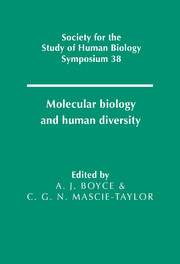Book contents
- Frontmatter
- Contents
- List of contributors
- Preface
- 1 Mitochondrial DNA in ancient and modern humans
- 2 Digital DNA typing of human paternal lineages
- 3 Minisatellites as tools for population genetic analysis
- 4 DNA fingerprinting: development of a technology and its application to the study of human populations
- 5 Kinship, inbreeding, and matching probabilities
- 6 Using the coalescent to interpret gene trees
- 7 Some attempts at measuring natural selection by malaria
- 8 AIDA: Geographical patterns of DNA diversity investigated by autocorrelation statistics
- 9 Mitochondrial DNA sequences in Europe: an insight into population history
- 10 Palaeolithic and neolithic contributions to the European mitochondrial gene pool
- 11 The molecular diversity of the Niokholo Mandenkalu from Eastern Senegal: an insight into West Africa genetic history
- 12 The peopling of Madagascar
- 13 Molecular perspectives on the colonisation of the Pacific
- 14 Population ancestry on Tristan da Cunha–the evidence of the individual
- 15 Linguistic divergence and genetic evolution: a molecular perspective from the New World
- 16 Allelic sequence diversity at the human β-globin locus
- 17 A nuclear perspective on human evolution
- 18 Contrasting gene trees and population trees of the evolution of modern humans
- 19 Methods and models for understanding human diversity
- Index
15 - Linguistic divergence and genetic evolution: a molecular perspective from the New World
Published online by Cambridge University Press: 19 September 2009
- Frontmatter
- Contents
- List of contributors
- Preface
- 1 Mitochondrial DNA in ancient and modern humans
- 2 Digital DNA typing of human paternal lineages
- 3 Minisatellites as tools for population genetic analysis
- 4 DNA fingerprinting: development of a technology and its application to the study of human populations
- 5 Kinship, inbreeding, and matching probabilities
- 6 Using the coalescent to interpret gene trees
- 7 Some attempts at measuring natural selection by malaria
- 8 AIDA: Geographical patterns of DNA diversity investigated by autocorrelation statistics
- 9 Mitochondrial DNA sequences in Europe: an insight into population history
- 10 Palaeolithic and neolithic contributions to the European mitochondrial gene pool
- 11 The molecular diversity of the Niokholo Mandenkalu from Eastern Senegal: an insight into West Africa genetic history
- 12 The peopling of Madagascar
- 13 Molecular perspectives on the colonisation of the Pacific
- 14 Population ancestry on Tristan da Cunha–the evidence of the individual
- 15 Linguistic divergence and genetic evolution: a molecular perspective from the New World
- 16 Allelic sequence diversity at the human β-globin locus
- 17 A nuclear perspective on human evolution
- 18 Contrasting gene trees and population trees of the evolution of modern humans
- 19 Methods and models for understanding human diversity
- Index
Summary
A unique characteristic of our species is that recent evolution has proceeded in two dimensions: biological and cultural. From a paleoanthropological perspective, the past two million years are defined as much in terms of cultural innovations as they are in terms of morphological change. The recognition that humans have been shaped by the intersection of two evolutionary processes has led to much speculation about the degree of interdependence and interaction between cultural and biological evolution. Attempts to understand the interplay between the two processes have ranged from metaphysical speculations (Teilhard de Chardin, 1957) to specific mathematical models (e.g. Cavalli-Sforza & Feldman, 1981; Lumsden & Wilson, 1983). However, apart from some broad generalizations, the parameters of this interaction remain undefined. In particular, we have little concrete knowledge about whether the tempo and mode of evolutionary change are concordant from one realm of evolution to the other. In part, this is because there are no wholly satisfactory measures of the cultural components of evolution: the cultural attributes that have been examined are either too superficial and ephemeral (e.g. incised patterns on pottery), or so fundamental to human behaviour that the interplay between biology and culture is inextricably intertwined (e.g. the transition between Oldowan and Acheulian).
- Type
- Chapter
- Information
- Molecular Biology and Human Diversity , pp. 205 - 224Publisher: Cambridge University PressPrint publication year: 1996
- 2
- Cited by



